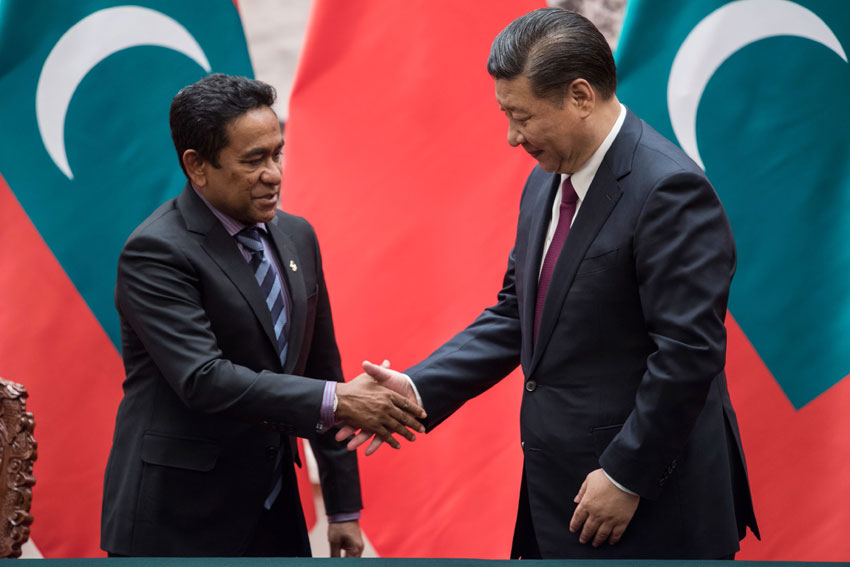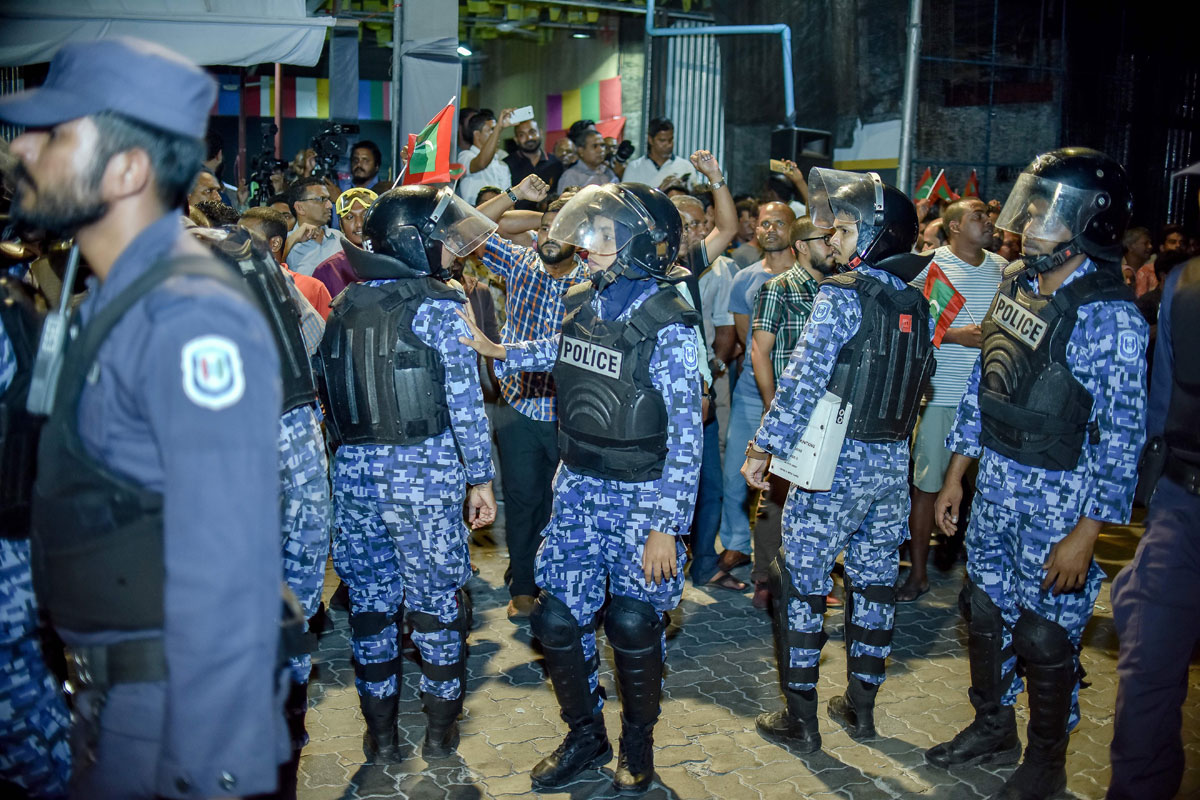The Maldivian Crisis Peaks: India’s Adopts a Non-Interventionist & Cautionary Approach
This picture taken on Feb. 21, shows Maldivian opposition supporters scuffling with security forces officers during a protest demanding the release of political prisoners in Male. Maldives President Abdulla Yameen extended a draconian state of emergency by another month on Feb. 20, ignoring a growing chorus of international concern and calls for democracy to be restored in the honeymoon islands. (Ahmed Shurau/AFP/Getty Images)
The Republic of Maldives or Dhivehi Raa’jeyge Jumhooriyya, an archipelago of 26 atolls dispersed in an area of 284 square kilometers in the Indian Ocean, is afflicted with yet another period of a seemingly unending political unrest, writes Priyanka Bhardwaj.
Following the dissolution of Parliament, and military occupation of the capital, Male, on Feb. 3, President Abdulla Yameen declared a state of emergency for 15 days, Feb. 5, that has been extended for another 30 days on Feb. 20.
This means wide-ranging powers to the island nation’s security forces from arrest of suspected opposition members to prohibition on public gatherings and imposition of travel restrictions.
The crisis was kicked off when, on Feb. 1, its Supreme Court overturned the convictions of Yameen’s rivals and ordered the reinstatement of 12 parliamentarians who were stripped of their seats last year when they defected from Yameen’s party to join the opposition.
Commensurate to these developments, India, China, the U.S., the UK and Australia have cautioned against the continuation of emergency, and issued travel advisories that warn against non-essential travel to the most desirable holiday paradise for many.
In the past years several reports by the governments of both the UK and USA governments have already been warning about the increasing possibility of terror attacks with the spurt in radicalization of Maldivian youth and numerous enlisting to fight for ISIL militants in the Middle East.
In the current context, not wanting to lose out on tourism, its principal economic activity that makes for 28 percent of the island nation’s GDP and more than 60 percent of foreign exchange receipts, the Maldives’ Ministry of Tourism has stated, “The Government assures tourism and travel trade that all tourism-related businesses will be operating as usual and the situation in the Maldives remains stable….Public safety is of paramount importance and the government assures the safety of the destination.”
The current crisis is the latest among a series of public agitations pertaining to democratic reforms, existing since 2000 and that peaked in the post-2011 period when dissident-activist and former President Mohamed Nasheed ended the three-decade-old reign of Maumoon Abdul Gayoom in 2008 when a new constitution was ratified, and the country’s first multi-party presidential elections were held two months later.
Nasheed’s tenure was, however, short-lived as in 2015 he was removed on charges, albeit unsubstantiated, of terrorism, and which laid the grounds for his asylum in the UK.
This has not stopped Nasheed from joining the opposition chorus against Yameen’s over-militarization and police action against the rising foment, terming the extension of emergency as illegal and unconstitutional, and imploring the UN and India to intervene and mediate talks.
In the run up to the India-Maldives ties, a couple of days ago, the Maldivian authorities “snubbed” India’s invitation to participate in the biennial naval exercise, attended by 15 other nations, citing ‘the prevalence of emergency that warrants the defense personnel to be stationed back home.’
In vain, the Maldivian Ambassador too attempted to assuage New Delhi by harping on the enduring nature of excellent defense and military relations between the two countries.
However, it has not been lost on anyone that in recent times India has been losing leverage in the Maldives to China in terms of trade and military presence in the region.
A Chinese warship flotilla was reportedly cited by the Indian Navy, to be heading for Maldives as soon as Nasheed called for India’s intervention.
In view of this the Indian Navy is said to be “carefully monitoring the situation” and has deployed a heavy presence of warships in the Arabian Sea, including many close to the Maldives.
In recent times the schism between the island nation and India occurred when Nasheed’s successor, President Mohammed Waheed Hassan annulled the $511 million worth of project for modernization of its international airport to an India-led consortium.
On the other hand, with the start of Yameen’s tenure in 2013, Chinese investments in Maldivian projects only shot up and were eventually granted the airport-modernization project, a special free Trade Agreement and special provisions to own land in the nation.
Chinese interest in the establishing a naval base in the Marao Island that sits close to international sea lanes and routes of oil imports to India has gripped not just India but also the USA that vies with China for influence in the Indian Ocean.

As of now Yameen is at his recalcitrant best and betrays no signs of yielding to international pressure to end the emergency any time soon.
Soon after turning down India’s invitation, Maldives State Health Minister Dunya Maumoon, niece of Yameen, resigned from the Cabinet after the arrest of her father and brother on charges of trying to topple the government and has appealed the world community to support the Maldivians in overcoming the crisis.
About fifty defense and police persons have already been detained by the loyalists of Yameen.
Yet, New Delhi has been successful, so far, to desist from any face off with the incumbent government of the Maldives.
This is in direct contrast from the 1988-Operation Cactus military intervention that had nipped the adventurism of foreign mercenaries of the People’s Liberation Organization of Tamil Eelam to topple dictator, Gayoom’s government.
Perhaps the present restraint stems from Prime Minister Narendra Modi not wanting to upset his domestic position in view of next year’s elections and also the country’s learning from its mistake of imposing sanctions against Nepal, when the latter was bailed out by Beijing with the supply of winter-fuel, and further cemented China-Nepal relations, while alerting neighbors of India’s hegemony.
Still New Delhi back stepped from playing host to a special envoy whom Yameen sent to “friendly nations” to provide a briefing on the situation.
This is not to say that there are no proponents of active intervention in the Maldives, but it appears that this time India has chosen to closely watch and respond and enlist the support of other world powers, namely the U.S. and the UK, if the case so demanded.


